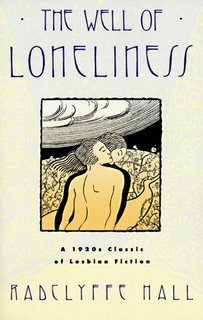
The Well of Loneliness. Radclyffe Hall
The Well of Loneliness is called the first undisguised lesbian novel in the English language, which makes it required reading for a women's studies class or scholarly lesbians. Yet, though written in 1928, it is still relevant to all people interested in issues of inclusiveness and diversity. Also, with its arguments based on Christian morality, it should get serious consideration by the religious right before they condemn homosexuality.
The novel is a fictionalized biography of a lesbian born in the 1890s to a well-to-do couple on a country estate in England. They were desiring a son and name their only daughter Stephen, the name they had selected for their heir. Her mother finds it difficult to get close to this girl whose favorite game is dressing up as Admiral Nelson, but her father treats her like the son he was denied. He teaches her horseback riding, and takes her on the local fox hunts where she excels.
Yet as she reaches puberty and young adulthood, her mannish behavior and dress starts to cause her problems. But this is Victorian England and certain things are just not spoken about, so Stephan grows up ignorant of what she is and how society feels about people like her. When her father dies her protection from the prejudices of society also disappears. She is ostracised and eventually forced out of her home by her mother.
This isn't an easy book to read. With such a title, you know that it isn't going to be a lot of fun. Yet Hall wonderfully represents Stephen's life and the adversity she faces because of a situation beyond her control. She argues that "inversion" is natural because lesbians exist in nature. Since nature is God's creation, so are lesbians and all other inverts of society. She is morally strong and wants to take her inherited place in society, but is blocked by mean-spirited and close-minded people. The book would be like Pride and Prejudice if there was only one daughter and she was gay.
The social turmoil and change in society that takes place because of World War I is well portrayed by the author. Stephen becomes an ambulance driver in France, and stays on in Paris seeking a community of like-minded people. Yet even there she cannot find peace and acceptance.
This is an important book because it takes a serious look at the role of gay people in society. All the issues that face this community today are raised by Radclyffe Hall. Social and religious condemnation, internalized oppression, and even the question of gay marriage are all addressed in clear and persuasive prose. The style is a bit formal and introspective, yet this glimpse into the individual is superbly portrayed and excellently developed. I found it slow moving, but with great emotional and intellectual impact.
No comments:
Post a Comment